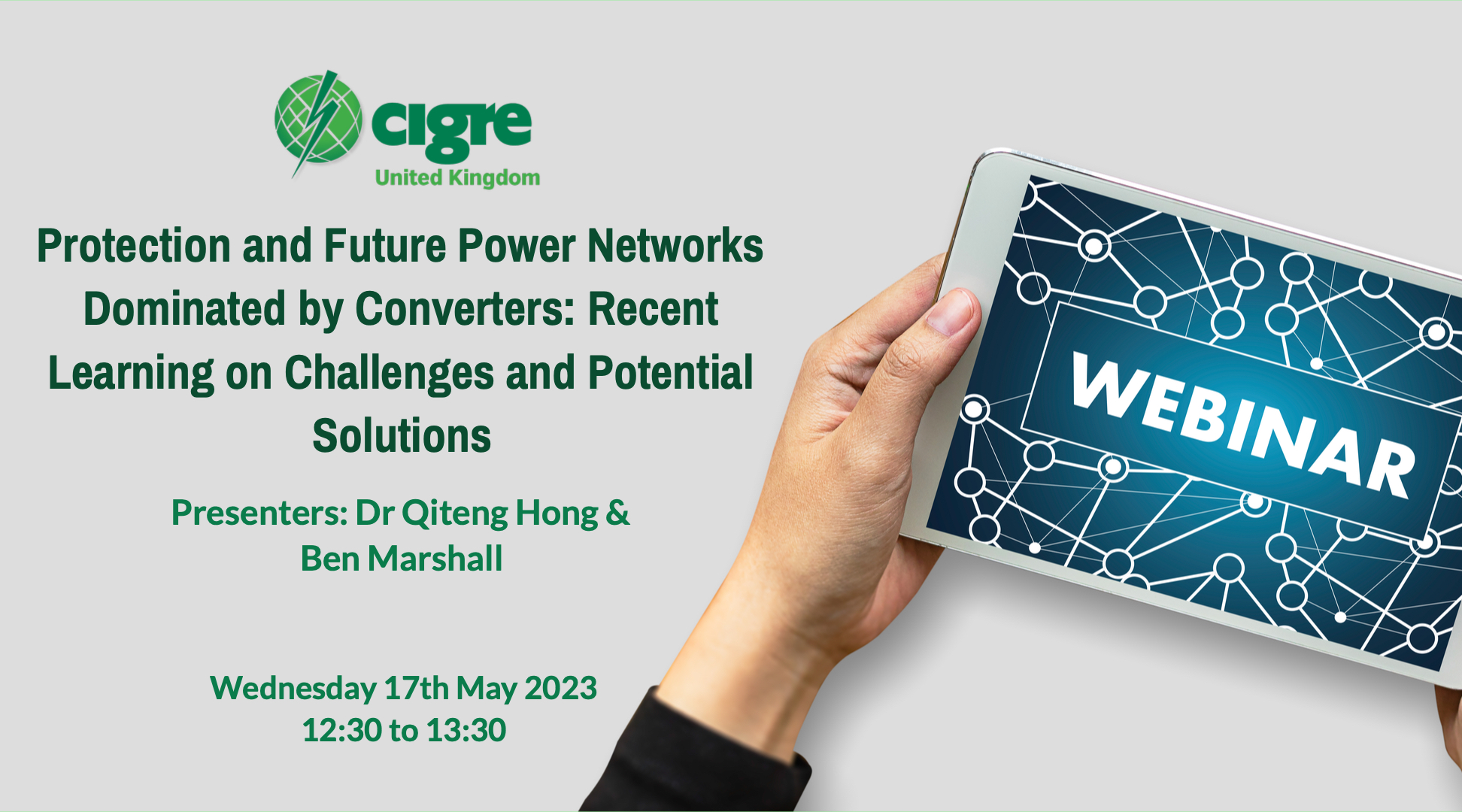
Protection of Future Power Networks Dominated by Converters: Recent Learnings on Challenges and Potential Solutions
Held Online| Wednesday 17th May 2023 | 12:30 – 13:30
–
ABOUT THIS EVENT:
To facilitate GB’s ambitious decarbonisation agenda, massive amounts of converter-interfaced resources (CBRs, e.g. HVDC systems, wind farms, etc.) are being integrated to the system. This will result in a reduced system fault level and vastly different fault characteristics, which present significant risks of comprised protection performance. The talk presented the latest learnings associated with the challenges on the protection system as a result of the massive increase of CBRs and the potential solutions for addressing such challenges. Detailed analysis of the protection issues caused by converters was presented, along with different converter control modes’ impact on protection performance. The need for maintaining a sufficient fault level and the limitations was discussed. The talk also presented potential solutions for addressing the protection challenges from the control perspective (i.e. refining the converter control to facilitate protection operation) and the protection algorithm perspective (emerging protection solutions, e.g. time-domain protection schemes), along with test results and analysis.
=
Protection of Future Power Networks Dominated by Converters
= –This Webinar series is kindly sponsored by Burns & McDonnell

SPEAKERS

Dr Qiteng Hong is presently a Senior Lecturer (Associate Professor) at the University of Strathclyde in the UK. He received his BEng (Hons) degree as the top graduate of the year in 2011 and PhD in 2015, both from Strathclyde. His main research area is on novel solutions for protection and control of future power systems with high penetrations of converter-interfaced renewable energy sources. Dr Hong has successfully led/completed over 40 research projects,along with more than 70 publications in international journals and conferences. Dr Hong is a Member in the CIGRE Working Group (WG) B5.50, IEEE WG P2004, IEEE Task Force on Cloud-Based Control of Multi-Party Resources, and IET DPSP Conference Technical Committee; he was the Technical Lead at the CIGRE UK Next Generation Network between 2016-2020 and the Honorary Secretary for the IET Scotland South West Committee until 2018; he is a guest editor for multiple prestigious journals – notably he is the Co-Guest Editor-in-Chief of the special issue on the operation of zero-carbon power system in International Journal of Electrical Power & Energy Systems. He received the IET Prize in 2011, the J. Lessells scholarship from Royal Society of Edinburgh in 2013 and the Best Paper Award in IEEE APAP Conference in 2019.
Ben Marshall, Technology Manager National HVDC centre, As the HVDC Technical Manager, Ben oversees the team of Simulation Engineers undertaking detailed HVDC simulation studies in real-time using vendor-supplied replica hardware, to understand multi-infeed, multi-terminal and multi-vendor HVDC operation and interactions, for real schemes in GB; interpreting the results to gain insights to improve the design and operation of HVDC schemes. Ben previously has had a 25 year long and varied career within National Grid with a broad range of experience, particularly with respect to the analysis of the operation and design of the AC and DC transmission systems. He has experience in both offline and real time EMT simulation and in modelling of convertors across battery, solar wind and HVDC systems, He has developed deep technical skills relating to dynamic stability of power systems and the performance specification of HVDC convertors. Within the Electricity System Operator, Ben advised on the specification, validation and modelling of new HVDC connections, supporting the compliance connection planning and requirements and provided technical leadership on AC and DC control systems, System Operability, Smart Grids and power system simulation; leading complex power system studies. He supports a range of current GB Grid Code changes surrounding power convertor integration, together with a number of CIGRE C4 and B4 working groups across interaction, interoperability and specification of power electronic converter performance, the stability workgroup of ENTSO-e and the HVDC SET plan for R&D in Europe. He and his team are currently advising various activities seeking to develop new protection solutions for power electronic dominated networks.
